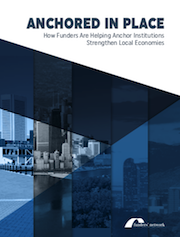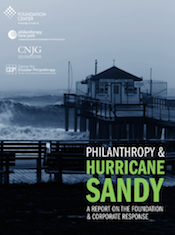Site Search
- resource provided by the Forum Network Knowledgebase.
Search Tip: Search with " " to find exact matches.
The Grantmakers Concerned for Immigrants and Refugees (GCIR) present this program coinciding with Women’s History Month. Bringing in leaders who work at the intersections of these identities, this webinar will provide an overview of the most pressing challenges faced by low-paid immigrant women as well as the diverse strategies groups are employing to address them. GCIR will focus on economic empowerment, we will explore how on the ways philanthropy can support the immediate needs of these communities while building long-term worker power that transcends migrant status and gender identity.
Registration:
There is no cost for this webinar.
You will need to log in or create an account on GCIR's website to register for this program.
Please register for this program by 5pm PT on Wednesday, March 26th.
Community foundations are beginning to deepen and shift how they work, adopting an anchor mission that seeks to fully deploy all resources to build community wealth. Moving into territory relatively uncharted for community foundations, they are taking up impact investing and economic development — some in advanced ways, others with small steps. This report offers an overview of how 30 representative community foundations — including The Seattle Foundation, the Vermont Community Foundation, and the Greater Cincinnati Foundation — are working toward adopting this new anchor mission.
This Democracy Collaborative report was written by Marjorie Kelly, Senior Fellow and Director of Special Projects and Violeta Duncan, Community Development Associate.
A CNJG member queried the corporate listserve on strategies or resources for virtual volunteering. CNJG compiled these responses, and listed the different opportunities that members are offering for employee volunteerism.

Anchor institutions can play a vital role in strengthening and connecting local economies, and can serve as powerful drivers for building inclusive and equitable communities. This report by the Funders’ Network for Smart Growth and Livable Communities as part of its Anchors Institution Funders’ Group examines the potential these deeply rooted local enterprises hold to create lasting and sustainable change—and illustrates how funders are working with anchor institutions to create healthier, more equitable, and economically vibrant places to live and work.
The report offers recommendations for funders looking to deepen and refine their strategies for working with anchors. In each of the profiled communities—Albuquerque, Baltimore, Chicago, Denver and the Twin Cities—the report shares stories of how funders are extending beyond traditional grantmaking roles to embrace their roles as conveners and leaders in their communities.
Several Atlantic City-based nonprofits received funding to further their missions this week.
The Atlantic City Community Fund in partnership with the Community Foundation of South Jersey awarded grants 37 organizations during a reception at Cardinal Restaurant in Atlantic City.
The annual celebration brought together local changemakers, fund partners and community leaders to recognize the impactful work being done across the city. Grantees had the opportunity to connect, share their missions and engage with the fund's board and supporters.
“The Atlantic City Community Fund is dedicated to empowering local organizations that are on the frontlines of positive change,” board President Benjamin Zeltner said. “This year’s group of grantees reflects the heart, resilience, and innovation of Atlantic City.”
M&T Bank has donated $75,000 in seed money to help the Center for Urban Entrepreneurship and Economic Development at Rutgers University launch a new fund to help Black entrepreneurs recover from the effects of the pandemic.
CUEED, based at the Rutgers Business School in Newark, will leverage the money from M&T to raise additional funding from other private and philanthropic sources. The center’s goal is to raise $250,000 to pilot its NJ BEST Patient Capital Fund, which will make low-cost, non-dilutive capital, recoverable grants of $25,000 to $50,000 available to selected Black-owned High-Impact Vital Enterprises — retail and service businesses essential to the viability of their communities.
Tom Comiskey, M&T Bank president for New Jersey, said the bank was excited to contribute to such a worthy aim.
“The pandemic has exacerbated challenges for Black entrepreneurs, making it increasingly difficult to secure capital for their businesses,” he said. “Essential to the foundation of New Jersey’s economy, M&T Bank is proud to support these business owners through the NJ BEST Patient Capital Fund.”

This new report from CNJG and partners examines the response of foundations, corporations, and other institutional donors to the devastation wrought by Hurricane Sandy in October 2012. Numbering nearly 600, these funders have so far committed more than $380 million for relief, recovery and building efforts. The hard data and reflective observations in the report contribute to the growing body of knowledge that helps foundations and corporations be strategic and effective with their giving when disaster strikes.
Two years after the historic storm, Philanthropy & Hurricane Sandy: A Report on the Foundation & Corporate Response breaks down the allocation of dollars contributed thus far and offers perspective on the role of private giving in disaster response and lessons to be taken from this one. The report was published by the Foundation Center in partnership with the Council of New Jersey Grantmakers and Philanthropy New York, and with support from the Center for Disaster Philanthropy.
“Throughout the past two years, our exceptional nonprofit and funder community has taken on challenges they never imagined,” said Nina Stack, president of the Council of New Jersey Grantmakers. “These organizations continue to develop innovative solutions that other communities will learn from and build upon in future disasters.”
In addition to the report’s numerous funders, CNJG wishes to thank the PSEG Foundation for supporting this project.
President Obama's Hurricane Sandy Task Force released this rebuilding strategy to serve as a model for communities across the nation facing greater risks from extreme weather and to continue helping the Sandy-affected region rebuild. The Rebuilding Strategy contains 69 policy recommendations, many of which have already been adopted, that will help homeowners stay in and repair their homes, strengthen small businesses and revitalize local economies and ensure entire communities are better able to withstand and recover from future storms.
